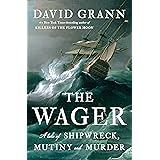
Download the free Kindle app and start reading Kindle books instantly on your smartphone, tablet, or computer - no Kindle device required.
Read instantly on your browser with Kindle for Web.
Using your mobile phone camera - scan the code below and download the Kindle app.

OK
 Audible sample Sample
Audible sample Sample 


Two years before the mast Paperback – September 10, 2010
- Print length388 pages
- LanguageEnglish
- PublisherNabu Press
- Publication dateSeptember 10, 2010
- Dimensions7.44 x 0.8 x 9.69 inches
- ISBN-101172305099
- ISBN-13978-1172305094
The Amazon Book Review
Book recommendations, author interviews, editors' picks, and more. Read it now.
Similar items that may deliver to you quickly
Product details
- Publisher : Nabu Press (September 10, 2010)
- Language : English
- Paperback : 388 pages
- ISBN-10 : 1172305099
- ISBN-13 : 978-1172305094
- Item Weight : 1.52 pounds
- Dimensions : 7.44 x 0.8 x 9.69 inches
- Customer Reviews:
About the author

Discover more of the author’s books, see similar authors, read author blogs and more
Customer reviews
Customer Reviews, including Product Star Ratings help customers to learn more about the product and decide whether it is the right product for them.
To calculate the overall star rating and percentage breakdown by star, we don’t use a simple average. Instead, our system considers things like how recent a review is and if the reviewer bought the item on Amazon. It also analyzed reviews to verify trustworthiness.
Learn more how customers reviews work on AmazonReviews with images
-
Top reviews
Top reviews from the United States
There was a problem filtering reviews right now. Please try again later.
What makes this read different from most of other reads:
- Other books in general:
...we set sail to the open waters, and struck by seasick I experienced the first tough night as a sailor on board.
- This book described what it was really like to sail out to the open waters for the first time:
...The little brig was close-hauled upon the wind, and lying over, as it then seemed to me, nearly upon her beam ends. The heavy head sea was beating against her bows with the noise and force almost of a sledgehammer, and flying over the deck, drenching us completely through. The topsail halyards had been let go, and the great sails were filling out and backing against the masts with a noise like thunder; the wind was whistling through the rigging; loose ropes were flying about; loud and, to me, unintelligible orders constantly given, and rapidly executed; and the sailors “singing out” at the ropes in their hoarse and peculiar strains. In addition to all this, I had not got my “sea legs on,” was dreadfully sea-sick, with hardly strength enough to hold on to anything, and it was “pitch dark.” This was my condition when I was ordered aloft, for the first time, to reef topsails. How I got along, I cannot now remember. I “laid out” on the yards and held on with all my strength. I could not have been of much service, for I remember having been sick several times before I left the topsail yard, making wild vomits into the black night, to leeward. Soon all was snug aloft, and we were again allowed to go below. This I did not consider much of a favor, for the confusion of everything below, and that inexpressible sickening smell, caused by the shaking up of bilge water in the hold, made the steerage but an indifferent refuge from the cold, wet decks. I had often read of the nautical experiences of others, but I felt as though there could be none worse than mine; for, in addition to every other evil, I could not but remember that this was only the first night of a two years’ voyage... I stood in the waist on the weather side, watching the gradual breaking of the day, and the first streaks of the early light. Much has been said of the sunrise at sea; but it will not compare with the sunrise on shore. It lacks the accompaniments of the songs of birds, the awakening hum of humanity, and the glancing of the first beams upon trees, hills, spires, and house-tops, to give it life and spirit. There is no scenery. But, although the actual rise of the sun at sea is not so beautiful, yet nothing will compare for melancholy and dreariness with the early breaking of day upon “Old Ocean’s gray and melancholy waste.” There is something in the first gray streaks stretching along the eastern horizon and throwing an indistinct light upon the face of the deep, which combines with the boundlessness and unknown depth of the sea around, and gives one a feeling of loneliness, of dread, and of melancholy foreboding, which nothing else in nature can. This gradually passes away as the light grows brighter, and when the sun comes up, the ordinary monotonous sea day begins. From such reflections as these, I was aroused by the order from the officer, “Forward there! rig the headpump!” I found that no time was allowed for daydreaming, but that we must “turn to” at the first light. Having called up the “idlers,” namely, carpenter, cook, and steward, and rigged the pump, we began washing down the decks. This operation, which is performed every morning at sea, takes nearly two hours; and I had hardly strength enough to get through it. After we had finished, swabbed down decks, and coiled up the rigging, I sat on the spars, waiting for seven bells, which was the signal for breakfast. The officer, seeing my lazy posture, ordered me to slush the mainmast, from the royal-mast-head down. The vessel was then rolling a little, and I had taken no food for three days, so that I felt tempted to tell him that I had rather wait till after breakfast; but I knew that I must “take the bull by the horns,” and that if I showed any sign of want of spirit or backwardness, I should be ruined at once. So I took my bucket of grease and climbed up to the royal-mast-head. Here the rocking of the vessel, which increases the higher you go from the foot of the mast, which is the fulcrum of the lever, and the smell of the grease, which offended my fastidious senses, upset my stomach again, and I was not a little rejoiced when I had finished my job and got upon the comparative terra firma of the deck. In a few minutes seven bells were struck, the log hove, the watch called, and we went to breakfast...
It's so before the 1840s: The value of this book is found with the lost names and words we can only find today in this kind of “firsthand” resources.
...Captain James Cook visited the islands on January 18, 1778, and named them the "Sandwich Islands" in honor of John Montagu, 4th Earl of Sandwich, who as the First Lord of the Admiralty was one of his sponsors. This name was in use until the 1840s, when the local name "Hawaii" gradually began to take precedence...
A good example of an educated man's way to see the world and people — Ignorance is easily filled with propagandas and biases.
Such a mind'/ ment'ality of a global citizen the man possessed.
The book is a history, geography, anthropology, personal essay, log book and definitely a “literature” probably thanks to the author’s Harvard education and skillful literacy that vividly described what the author saw, did and thought, although quite many mistakes have been found to be edited.
Some stereotypes of the 19th century, too, are found that might still exist today, but I’d say the ignorance of its time wasn't a sin, but innocence, whereas deliberate indifference is totally a different story.
So many lives sacrificed for business purposes...the author’s ship alone took tens of thousands of animal skins from California in a single journey! Not only animals for mere skins, but sailors’ well-being, too, were less important than profit:
...Fortunately, I needed no help from any one, and no medicine; and if I had needed help I don’t know where I should have found it. Sailors are willing enough, but it is true, as is often said — no one ships for nurse on board a vessel. Our merchant ships are always undermanned, and if one man is lost by sickness, they cannot spare another to take care of him. A sailor is always presumed to be well, and if he’s sick he’s a poor dog. One has to stand his wheel, and another his lookout, and the sooner he gets on deck again the better.
Still found in most of businesses today since it is natural that the owners somehow have to find a way to reduce expenses, and they often decide to save the labor cost. Upon this "norm" our current world was built, and under this norm our Humanity is often ignored for good-old profit's sake.
The book teaches readers how big a difference a single “good” leader can bring to his or her crews under the same circumstances.
The readers also learn to call all things for sailing that we the Marines and Sailors still use on board today. It is like the beginning stage of your long military service in the Marines.
The book is a treasure since it doesn’t sugarcoat the experience on purpose with romantic and poetic fanciness to hook up countless poor, young souls into the service without knowing what they would be really facing in reality. Millions of these poor, but tough and proud souls have built many maritime empires in history, and I won't bitch about what they have destroyed and built because I respect their crucial roles and what each of these tough souls got through in the process.
Personally this read gave me a lot of thoughts since the author introduced in detail the American sailors' thoughts and feelings in “California, January 1835”, before she joined the Federation.
So California under independent Mexico led by Santa Anna at the time... The U.S. didn't even include Texas at the time. It was the exact year of the Independence War of Texas from Mexico and the famous story of Alamo. The book's an amazing treasure indeed.
Sounds like the Spanish and Mexican authorities didn't really know how to make her a better place. Soon, the Bear Republic, like Texas did, would join the United States. What a coincidence: At around the same time the Gold Rush hit the state, and the place was a totally different new world ever since.
She is now the U.S. State of California, but why do the land and people in the book all sound so familiar? About the high tax for businesses and all...and our easy-go-lucky-kinda personalities in general (or some might call it careless or idle) despite the fact both Silicon Valley and Hollywood are located in the state bringing the whole nation more “national income” than all other states' combined.
Today the sea journey between the East and West Coast is done in matter of months through Panama Canal. Things definitely get better and better for us as time passes by, but come to think about it, so are our demands...sigh.
In this book the 19th century working routines have been precisely described. The farmers and every common people like us worked all day long between daybreak (breakfast) and sunset (dinner) ex-cept/ -sauf/ -save lunch time. If you were my own or my parents' generation you would still remember what it was like to go to school or to work in normal professions back in the 20th century. We have much easier lives today, yet we only want more and more without having learned to be satisfied with what we already got in our lives, and someday either our inefficient, lazy society will go down the toilet as a whole or we the people will be all replaced by robots after all.
What we are losing is the sense of responsibility, appreciation and patience of real grown-ups.
Back in the day couples got letters from each other every one month or two, yet they were patient and faithful to each other. You realize how spoiled we tend to become as our lives get easier? We are supposed to grow as centuries pass by; let's keep that in mind.
This book describes the hardship of the sailors’ daily lives on board, especially under harsh climates, and make the readers learn to appreciate what we take for granted such as our nutritious daily meals, dry clothes and freedom to make our decisions about where to go, what to eat or how to spend our time. And we should also remember that, without these sailors in their places, our societies will suddenly be plunged into chaos under shortage of all sorts of our daily goods and energy sources we take for granted without a second thought.
Will all our ignorance (or indifference) be really justified? See in the future, shall we?
Top reviews from other countries
Richard Henry Dana related his time aboard ship in a way which I found captivating; constantly waiting for the next call, "All hands ahoy." And the sorrow felt about the tragic loss of a man overboard and the emptiness felt aboard ship afterwards was so sensitively related that it brought tears to my eyes.
The extreme harsh conditions that the sailors endured is unbelievable; not only from the daily battle against the eliments but also from the tyrannical ship's captain. The poor sailors had hardly any time to themselves; often their few free hours on a Sunday afternoon was spent on the constant necessity of repairing their clothing.











